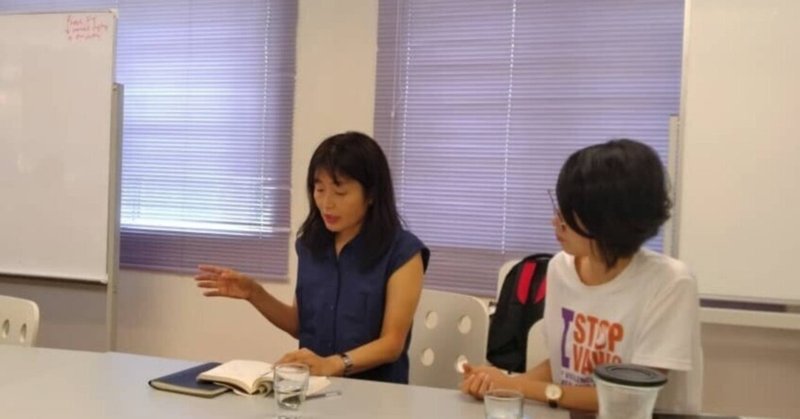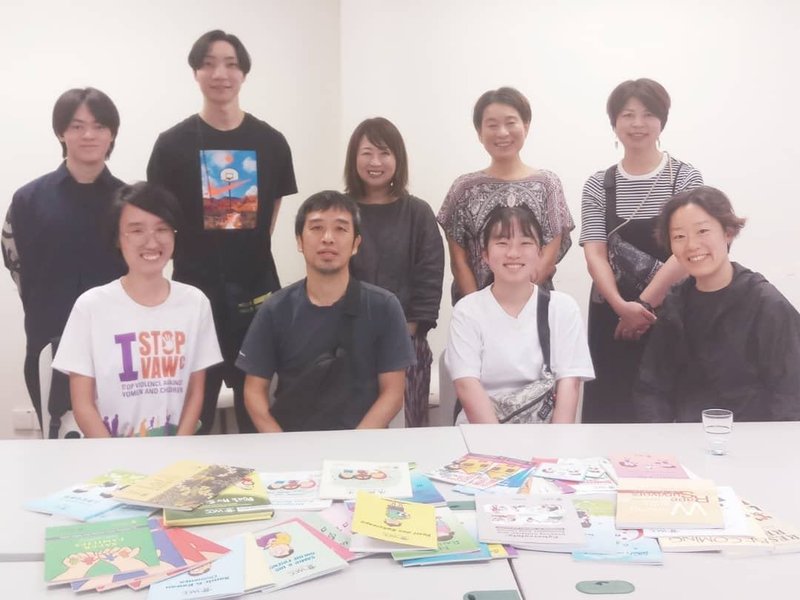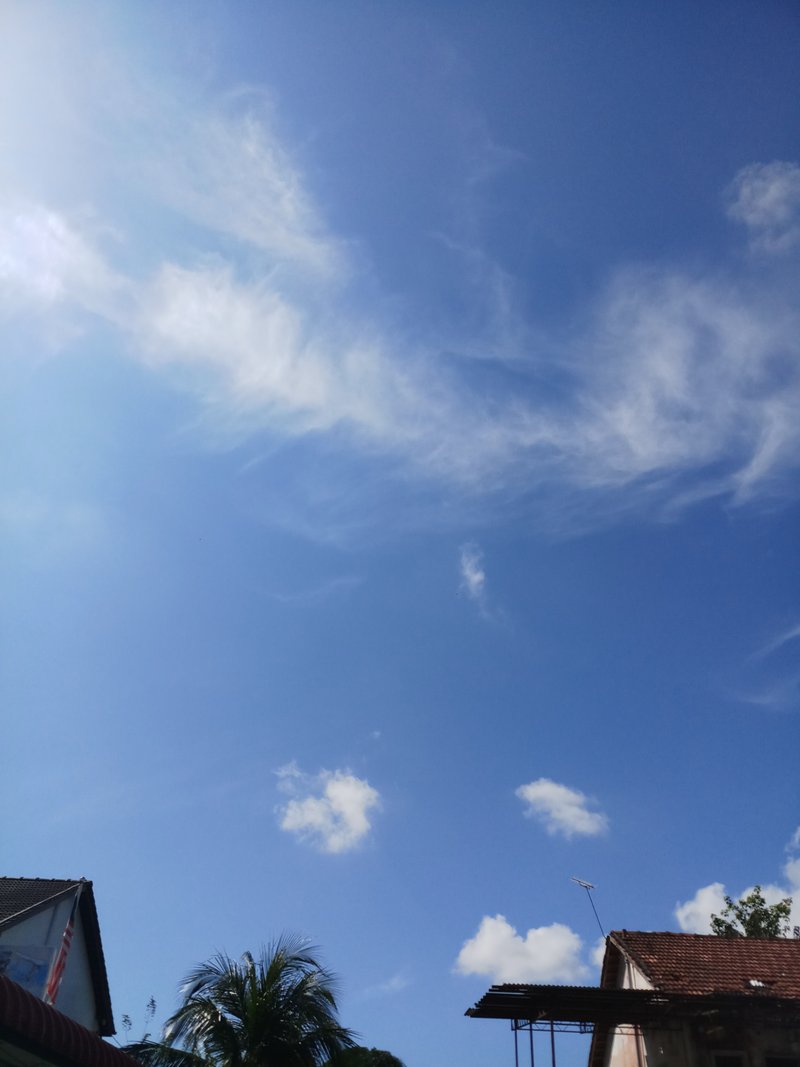
異なるものと出会うとは。そしてキャッチボールとしての小説ーWCC(変革のための女性のセンター)で【後編】
クライアント(性暴力を受けWCCにサポートを依頼している人)に寄りそう姿勢も一貫していて、たとえば、裁判での不安を軽減するために小冊子を作っている。
そこでは、裁判で、どんな言葉が使われ、どんなことが起こるのかなどが記述されている。ただでさえ、恐ろしい目にあったクライアントが、少しでも穏やかにいられるようにというもので、精神的なサポートを重視し、物理的にそれに応えているというのが分かる。
ーー
この日は、日本人参加者からのすばらしい質問もあがり、それによってさらに理解が深まった。
たとえば、大学に入学する直前のMさん。
「私の高校では、性教育の話はほとんどありませんでした。友達同士でも先生たちもそれを避ける傾向でした」
マレーシアでも同じです、とヨン・イーさんは深くうなずいた。
また、貧困状態の女性にどう援助するかといったことや、なぜ性暴力に特化しているのかといった質問も議論を深めた。
「性的な表現の広告がないのは、宗教の理由ですか?」という質問。
「マレーシアの文化だと思います」と彼女は答えた。外国にくるというのは、本当はこういうことではないかと思った。違いを通して、複眼をつくることだと。
啓蒙活動しているヒロ君は、いくつもの質問があった。日本で女性やマイノリティー支援活動などをしているNPOの多くは、資金が足りず、働いている人は厳しい状態になりやすいそうだ。
「ここではスタッフは安定して働ける状態なんですか?」
「給料がどんどん上がっていく、というような企業のシステムとは違います。ですが、私たちは、州政府からの助成金や様々な企業や個人からも支援されていて、14人の職員も安定して働くことができています」
参加者の人たちは、それぞれに、この機会を大事なものとして真剣に受け取ったことが、質問からも分かった。
私は、ふっと背中の力を緩めた。

みんながざわざわと片付けをしているとき、ヨン・イ-さんが、私のほうを向いた。
「エイミー、あなたのバックグラウンドはなんなの?」
「私は、ずっとジェンダーのことに関心があったの。それで、大学院でジェンダースタディーズを学んだわ」
私は普段言わないことを言っていた。ずっと前のことだし、普段そんなことを言う機会がないから、いつの間にか口に出すことも減っていた。
ああ、なるほど、とヨン・イ-さんはうなずいた。私がとても熱心な様子に気づいていたんだろう。
「私は今は作家で、2冊、小説を出しているの。最初の1冊は、年上の男の人とデートしてお金をもらっている女子高生マイが主人公なの。それはつまり、exploitationよね」
ああ、と彼女はうなずく。
「他のテーマも入ってるの」私は続けた。
「この島に住んでいた男の子が出てくるの。ペナン島とは書かなかったけど。このすぐ近くに、インターナショナルスクールあるでしょ? あそこに彼は通っていたの。彼の名前はジミー」
うん、と彼女は言う。
「ジミーとあうことで、マイは変わるの」
ヨン・イ-さんはにっこりとうなずいた。
私は不思議な気持ちになっていた。ジェンダースタディーズを学んだ自分がペナン島に住んだこと。そこに住んでいたはずのジミー。
そして、私はいまここで、その話をしていること。。
「それ、英語で読めるの?」
ヨン・イーさんに急にきかれて、私ははっとした。
「ううん。日本語で書いたから」
「英語だったら読みたかったのに」
ヨン・イーさんは残念そうに言った。
私はうなずいて、ふと思った。
『ジミー』を英語にしようかな、と。
小説とは、現実の出来事との、時間を経たキャッチボールのようなものかもしれない。
それなら、ペナン島にむけて、英語で返してもいいかなと思った。
青い空に、ポーンと、ボールを投げるように。

(終わり)
このすばらしい機会を与えてくださったWCCの方々、関係者の方々、参加してくださったみなさんに感謝しています。
WCCのサイト↓
ーーー
English translation is done by AI.
WCC is also consistent in their approach to their clients (those who have been sexually abused and request support from WCC). For example, they have produced a booklet to alleviate anxiety during court proceedings.
The booklet describes what language is used and what happens in court. The idea is to help clients who have just been through a horrific experience and you can see that they provide both emotional support and realistic support.
ーー
The Japanese participants asked some excellent questions, which further deepened understanding.
For example, Ms. M, just before entering college.
"At my high school, there was very little talk about sex education. My friends and teachers tended to avoid it."
Yong Yee nodded deeply, "It is the same in Malaysia."
Questions about how to help women in poverty and why they specialize in sexual violence also deepened the discussion.
One asked, "Is it because of the religion in Malaysia that you don't have any sexually explicit ads?"
She replied, "I think it's Malaysian culture."
This is what coming to a foreign country is really about, I thought. To create multiple perspectives through differences.
Hiro, who provides educational activities in Japan, had a number of questions. He said that many NPOs in Japan that support women and minority groups are underfunded, and those who work for them tend to be in a difficult situation financially.
He asked, "Are the staff here in a stable position to work?"
Yong Yee answerd. "We are not like the corporate system, where salaries keep going up and up and up. But we are supported by grants from the state government as well as various companies and individuals, so our 14 staff members have stable incomes"
It was clear from the questions that each participant took this opportunity seriously as an important one.
I relaxed a little.
As everyone was busily cleaning up, Yong Yee turned to me and said, "Amy, what is your background?
"I've always been interested in gender issues, so I studied gender studies in graduate school."
I said something I usually don't say. It had been a long time ago, and I didn't usually have the opportunity to say such things, so before I knew it, I was saying them less and less.
"Oh, I see,"
Yong Yee nodded. She must have noticed how enthusiastic I was.
"I'm an author now, and I've published two novels. The first one is about a high school girl who dates older men and gets paid for it. That's exploitation, you know."
"Oh," she nodded.
"There are other themes in there, too," I said,
"There's a boy who used to live on this island. I didn't specify it as being Penang Island though. There is an international school near here, right? That's where he went to school. His name is Jimmy."
I continued.
"Seeing Jimmy changed Mai, the girl."
Yong Yee nodded.
It felt strange. I wondered how it was that I, who had studied Gender Studies, had come to live on the island of Penang.
Jimmy, the most important character of my book supposedly lived here on this island.
And here I am, talking about Jimmy.
"Is your book written in English?"
Yong Yee suddenly asked me.
"No. I wrote it in Japanese."
"If it had been in English, I would have wanted to read it." she told me.
I nodded.
It occurred to me. I feel that "Jimmy" could have been written in English.
A novel might be like a catch-all with real events over time for me. Then, I might return it in English to the island of Penang.
Like throwing a ball into the blue sky.
(End)
Translated with DeepL.com (free version)
I am grateful to the WCC for this wonderful opportunity, to everyone involved, and to everyone who participated.
WCC website
いつもありがとうございます。いま、クンダリーニヨガのトライアルを無料でお受けしているのでよかったらご検討ください。
